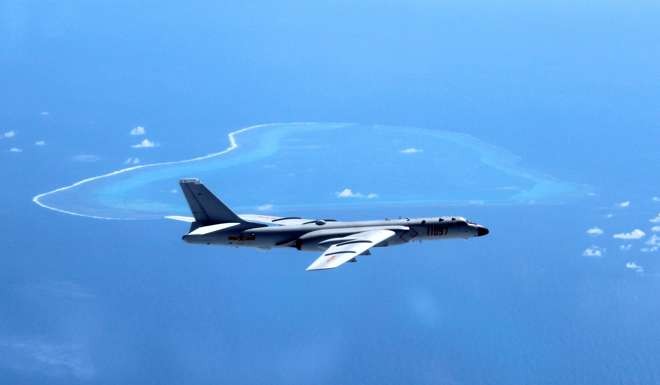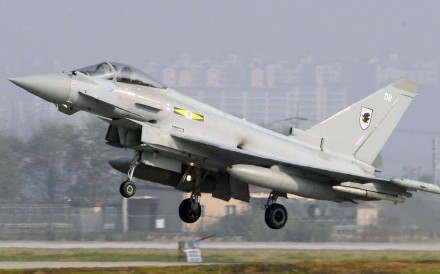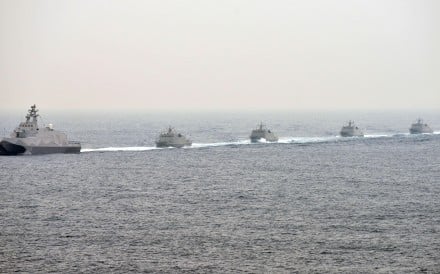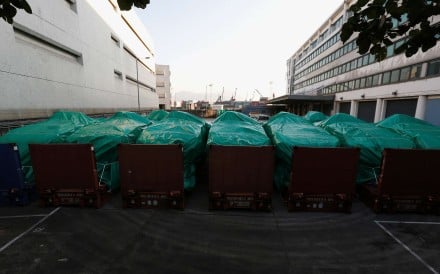China’s military-foreign ministry divide ‘muddies South China Sea waters’
scmp
Chinese armed forces adopting more hawkish stance over claims to sovereignty than nation’s diplomats and the disagreement is ratcheting up tensions, they say
PUBLISHED : Saturday, 03 December, 2016, 11:04am
UPDATED : Saturday, 03 December, 2016, 11:05pm
Sovereignty disputes in the South China Sea have been blown out of proportion partly because of intense internal differences in China over the handling of the maritime rows, according to a prominent US expert.
Stapleton Roy, a former US ambassador to Beijing, also said the escalation of tensions in the South China Sea was partly due to both China and the US allowing their militaries to play too large a role in the handling of the disputes. 

“South China Sea disputes have been much higher profile than they should have been,” Roy said.
Part of the problem is China cannot clarify its position because of its internal dispute [between the foreign ministry and the military]
“Part of the problem is China cannot clarify its position because of its internal dispute [between the foreign ministry and the military]. Therefore, no one knows if China is claiming rights within the nine-dash line or not.
“Sources say the dispute is so sensitive that it cannot be resolved at present time, even with a strongman leader like [Chinese President] Xi Jinping in power,” he said.
The Chinese foreign ministry regularly issues statements saying China claims all islands and reefs in the South China Sea without claiming special rights in the waters, but Chinese behaviour suggests it is claiming rights within the nine-dash line, according to Roy.
“Various parties in China, including the fishing industry and the ships that protect the fishing boats, are acting inconsistently with the foreign ministry position. I’ve heard Chinese admirals tell me that all of the waters inside the nine-dash line are Chinese territorial waters. You see some people, not just those in the military, feel that way inside China,” he said.

Roy served in Beijing from 1991 to 1995 and is the founding director emeritus of the Kissinger Institute on China and the US at the Woodrow Wilson International Centre in Washington.
He is critical of the role both Chinese and the US militaries have played in the South China Sea disputes.
“When we were moving aircraft carriers to the South China Sea and are running frequent freedom of navigation operations, China and Russia held joint military exercises in the disputed waters. Is it the right way to deal with this issue?” he said.
David Lampton, a China expert at the Johns Hopkins School of Advanced International Studies, also said it was unwise of China to hold a joint exercise with Russia in September with suggestions that its purpose was to practise seizing island territory.
“You can hardly be surprised that others react when China and Russia have island-grabbing exercises. China is a big power and if China does things, its neighbours and other big powers, including the US and Japan, will react. So maybe we both will have to be careful what we are doing,” he said.
Lampton, a former president of the National Committee on United States-China Relations, agreed there were policy differences between China’s military and foreign ministry over the maritime disputes.
“Militaries everywhere want more resources than the civilians want to give them. They are more jealous guardians of sovereignty and their own right to manoeuvre,” he said.
Both analysts noted the differences between the US military, which swears allegiance to the constitution and the Chinese military that vows to protect the Communist Party.
Every system has problems but actually I think it’s easier for us to control our military than for China to control their military
“In a party, it matters who is the leader, how strong the leader is and what his viewpoint is. Every system has problems but actually I think it’s easier for us to control our military than for China to control their military,” Lampton said.
Roy believed the US and other nations have failed to pay close attention to some of the remarks made by Xi during his visit to Washington a year ago, when he appealed for greater diplomatic effort to solve maritime disputes.
“When Xi, speaking on the record, put together no intention of militarisation, more effective implementation of the code of conduct on parties and calls for a speedy conclusion of consultations, it seems to me the diplomatic track should be getting more attention,” he said. “China is saying it’s prepared to negotiate a territorial issue in the Spratly Islands, but the US side paid no attention and did not pick up on that.”

He added there was no point questioning Xi’s sincerity in making those statements. “If the Chinese president makes the statement, you accept it at face value. So this is why I am critical of the US position,” Roy said.
Analysts said China had not undertaken any provocative steps since a landmark ruling by the international Permanent Court of Arbitration in The Hague in July, which rejected Beijing’s claims to much of the South China Sea.
Relations between China and Southeast Asian nations appear to have improved markedly, with Beijing enticing its neighbours, including rival claimants the Philippines, Malaysia and Vietnam, with lucrative trade and investment deals.
If China and the Philippines can find ways to lower tensions with respect to their claims in the South China Sea, it will be a step towards lowering tensions overall
US experts said new Philippine President Rodrigo Duterte, despite being largely unpredictable, had chosen to reach out to China instead of using the ruling, which Beijing deemed as a humiliating diplomatic defeat, to confront Beijing.
“If China and the Philippines can find ways to lower tensions with respect to their claims in the South China Sea, it will be a step towards lowering tensions overall,” Roy said.
But analysts remained cautious over the prospect of resolving long-standing South China Sea disputes, citing uncertainty resulting from the rise of unpredictable leaders such as Duterte and US president-elect Donald Trump.
“We have this unpredictable new president in the Philippines, who has been behaving in the ways that people did not anticipate,” Roy said. And how the new US administration under Trump handles the maritime disputes largely depended on what the situation was when he took office next month, he added.
Bonnie Glaser, an expert on Asia at the Washington-based Centre for Strategic and International Studies, said: “Apparently, China wants to completely ignore the ruling, but I don’t think the US, and more importantly the Philippines and other rival claimants, would agree.
“Some people say China may take advantage of Obama’s final months and China will test a new US administration. We’ll have to wait and see,” she said.
This article appeared in the South China Morning Post print edition as:
‘discord in Beijing worsens sea row’






















No comments:
Post a Comment